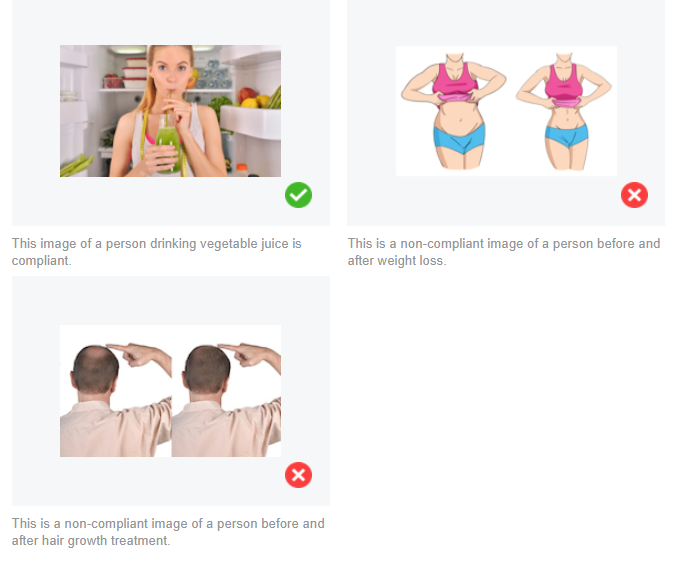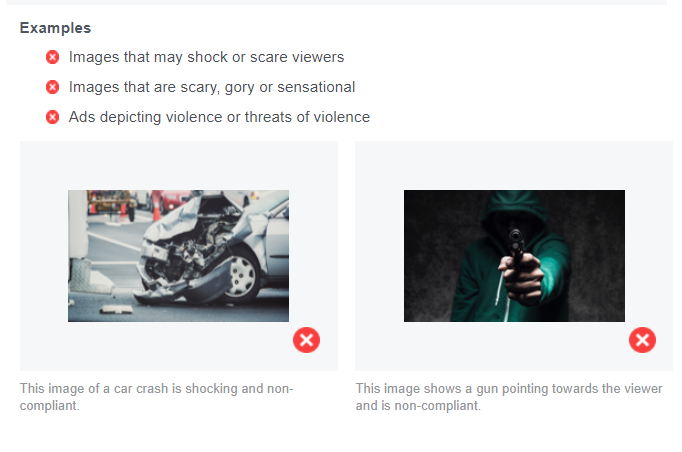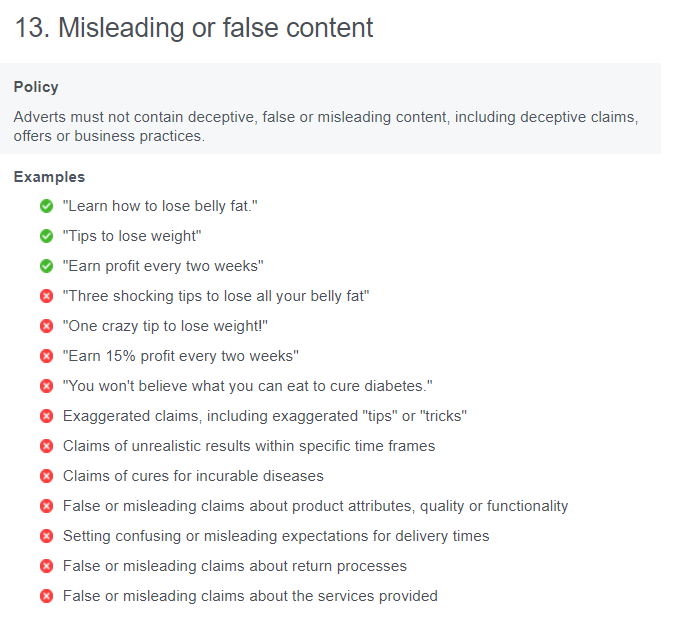Did you know that there are certain things you CANNOT say in your Facebook ads and specific image types that you CANNOT use?
Using terms and creatives against Facebook’s ad policy can lead to your ad being disapproved, or worse, your ad account banned.
In this article, I’m going to discuss the most common mistakes that marketers make that get their ads disapproved or their entire ad account banned.
Using unsuitable images
Did you know that you cannot use before and after images in your Facebook ads?
They may be one of the best ways to get your message across for your product, but they are always the fastest way into Facebook’s bad books:

The reason why before and after shots are not allowed within ads is because they can be misleading and make the user feel bad about the way they look.
Facebook doesn’t want to mislead their users or make them feel bad because it’s bad for business. If you feel bad after visiting Facebook or you were misled and bought a product, the chances you’ll visit Facebook or buy something from an ad are diminished.
“But my product does exactly what I wrote in the ad, it works, and it’s not misleading!”
Even if you have a stellar product with thousands of reviews, you’ll need to use compliant images as shown in the example above.
You also cannot use images that shock or scare users or those that are sensational or contain acts of violence:

Shock and awe images do very well because they grab a user’s attention on the news feed; however, they often evoke a negative feeling from users which, again, can cause them to not visit Facebook as often.
Misleading or clickbait titles
It’s totally fine to write a blog post using the following topic titles:
- Follow this one tip to lose 25% of body fat in 2 weeks
- How to burn more fat in less time, guaranteed!
- How to make $5,000 working 5 hours per week
- Take this [product] and reduce your stress and anxiety by 90%
Marketers who come from organic and blogging backgrounds often make the mistake of using misleading text or clickbait in their ads.
You CANNOT state in your text heading anything that may appear to be misleading, false, or deceptive.
For example, if you’re selling a health product that helps people lose weight, you cannot say:
“Use our product for 3 weeks and you’ll lose 15 lbs”
That statement is making an unrealistic claim stating the user WILL lose 15lbs in 3 weeks, but the following would be acceptable:
“Learn how our products can aid in reaching your health goals”
When coming up with your text headings, ask yourself if anything you said could be considered to be misleading, false, or unrealistic.

Listing personal attributes
The final biggest mistake I see marketers make when running ads on Facebook is overusing personal attributes to get a user’s attention.
Listing personal attributes can come in the following forms:
- Race
- Religion or personal beliefs
- Age
- Sexual behavior
- Mediation conditions
- Financial position
For example you cannot say any of the following in your ads:
- Meet other Indian singles in New York
- Are you Muslim?
- Meet other seniors over 65
- Are you lesbian?
- Do you suffer from stress?
- Are you broke?
If you use any of these phrases, your ads will most likely be disapproved right away.
You can say the following:
- Meet Indian girls online today
- Date Muslim singles
- Meet seniors
- Try our gay dating site
- We offer treatments for anyone who is suffering from stress
- We provide financial services regardless of your financial history
The first set of bullet points are stronger and more likely to grab a user’s attention, but also box people into groups that may hinder their Facebook user experience.
For example, if you have $0 in the bank, do you really want to see ads that keep telling you that you’re broke?
Facebook is a social media platform, so users don’t want to be assaulted or aggressively targeted using their personal attributes on there.
Your turn
When writing Facebook ad copy for the first time, dial down your copywriting flair.
You may get away with writing “you WILL lose weight using our product” on your blog post or landing page, but not on Facebook.
Put yourself in your audience’s shoes and ask yourself if anything in your ad copy may be misleading, false, or offending, because that’s what Facebook is doing.
You can read Facebook’s entire Facebook ad policy to find out what you can and cannot do within your ads.